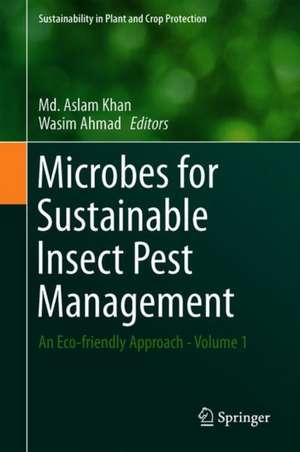Microbes for Sustainable Insect Pest Management: An Eco-friendly Approach - Volume 1: Sustainability in Plant and Crop Protection
Editat de Md. Aslam Khan, Wasim Ahmaden Limba Engleză Hardback – 30 sep 2019
| Toate formatele și edițiile | Preț | Express |
|---|---|---|
| Paperback (1) | 792.91 lei 38-44 zile | |
| Springer International Publishing – 30 sep 2020 | 792.91 lei 38-44 zile | |
| Hardback (1) | 800.05 lei 38-44 zile | |
| Springer International Publishing – 30 sep 2019 | 800.05 lei 38-44 zile |
Din seria Sustainability in Plant and Crop Protection
- 18%
 Preț: 1244.08 lei
Preț: 1244.08 lei - 24%
 Preț: 794.98 lei
Preț: 794.98 lei - 18%
 Preț: 1126.59 lei
Preț: 1126.59 lei - 15%
 Preț: 648.24 lei
Preț: 648.24 lei - 24%
 Preț: 781.66 lei
Preț: 781.66 lei - 18%
 Preț: 1107.56 lei
Preț: 1107.56 lei - 24%
 Preț: 818.78 lei
Preț: 818.78 lei - 24%
 Preț: 810.46 lei
Preț: 810.46 lei - 24%
 Preț: 1053.53 lei
Preț: 1053.53 lei - 24%
 Preț: 792.91 lei
Preț: 792.91 lei - 20%
 Preț: 558.52 lei
Preț: 558.52 lei - 23%
 Preț: 579.83 lei
Preț: 579.83 lei - 24%
 Preț: 835.82 lei
Preț: 835.82 lei - 18%
 Preț: 944.67 lei
Preț: 944.67 lei - 18%
 Preț: 1380.98 lei
Preț: 1380.98 lei - 18%
 Preț: 951.91 lei
Preț: 951.91 lei - 18%
 Preț: 1229.28 lei
Preț: 1229.28 lei
Preț: 800.05 lei
Preț vechi: 1052.70 lei
-24% Nou
Puncte Express: 1200
Preț estimativ în valută:
153.09€ • 166.81$ • 129.00£
153.09€ • 166.81$ • 129.00£
Carte tipărită la comandă
Livrare economică 19-25 aprilie
Preluare comenzi: 021 569.72.76
Specificații
ISBN-13: 9783030230449
ISBN-10: 3030230449
Pagini: 452
Ilustrații: X, 396 p. 25 illus., 19 illus. in color.
Dimensiuni: 155 x 235 mm
Greutate: 0.68 kg
Ediția:1st ed. 2019
Editura: Springer International Publishing
Colecția Springer
Seria Sustainability in Plant and Crop Protection
Locul publicării:Cham, Switzerland
ISBN-10: 3030230449
Pagini: 452
Ilustrații: X, 396 p. 25 illus., 19 illus. in color.
Dimensiuni: 155 x 235 mm
Greutate: 0.68 kg
Ediția:1st ed. 2019
Editura: Springer International Publishing
Colecția Springer
Seria Sustainability in Plant and Crop Protection
Locul publicării:Cham, Switzerland
Cuprins
1. Synthetic Chemical Insecticides: Environmental and Agro Contaminants.- 2. Soil-Borne Entomopathogenic Bacteria and Fungi.- 3. Molecular Phylogeny of Entomopathogens.- 4. Potential of Entomopathogenic Bacteria and Fungi.- 5. Ascomycota and Integrated Pest Management.- 6. Thermotolerance of Fungal Conidia.- 7. Oxidative Stress in Entomopathogenic Fungi and its Potential Role on Mycoinsecticide Enhancement.- 8. Effects of Cytotoxic Factors Produced by Entomopathogenic Bacteria on Insect Haemocytes.- 9. Effects of Entomopathogenic Nematodes and Symbiotic Bacteria, on non-target Arthropods.- 10. Granuloviruses in Insect Pest Management.- 11. Interactions of Entomopathogens with Other Pest Management Options.- 12. Toxicological Prospects on Joint Action of Microbial Insecticides and Chemical Pesticides.- 13. Entomopathogen and Synthetic Chemical Insecticide: Synergist and Antagonist.- 14. Current State of Fungal Antagonists with Special Emphasis on Indian Scenario.
Notă biografică
Md. Aslam Khan Ph.D (2006) in Entomology (Zoology), from Aligarh Muslim University, India, is Assistant Professor at the Department of Biology, Jazan University, Saudi Arabia. Dr. Khan has more than 13 years of teaching and research experience in microbial control of insect pests. As Research Associate, he worked for Ministry of Science & Technology, Govt. of India. He has also to his credit more than 47 research publications in peer-reviewed national and international journals, including 13 book chapters and two book volumes with International publishers. He is fellow of the reputed scientific societies like Royal entomological society of London, The linnean society of London, The entomological society of India. His work is mainly focus on management of insect pests using non chemical means.Wasim Ahmad Ph. D (1981), D. Sc (1993) in Nematology (Zoology) from Aligarh Muslim University is a Professor (full) of Nematology at Department of Zoology, Aligarh Muslim University, India. He has wide experience of working in leading Nematology laboratories of the world and has published extensively on nematode taxonomy, ecology and the role of Entomopathogenic nematodes in insect biocontrol. He is recipient of several national and International awards and is Fellow of the National Academy of Sciences (FNASc) and the National Academy of Agriculture Sciences (FNAAS) India.
Textul de pe ultima copertă
The focus of this book is on the potential of entomopathogens in agroecosystem functioning. Entomopathogens are natural enemies of insect pests and have been regularly isolated around the world for pest management purposes. Employing entomopathogens to combat insect pests of agricultural importance has gained momentum due to ecofriendly approaches applied. Although they play a critical role in IPM they remain relatively underutilized despite their many advantages over other biological and chemical products. The different chapters throw light on topics such as soil-borne entomopathogens and their molecular phylogeny; ascomycota and IPM; conidial thermotolerance; oxidative stress for mycoinsecticide enhancement; cytotoxic factors of entomopathogenic bacteria and insect haemocytes; EPN and non-target arthropods; granuloviruses and IPM; entomopathogens with other pest management options; synergism and antagonism among entomopathogen and chemical insecticides. Microbes for Sustainable Insect Pest Management, Volume 1: An Eco-friendly Approach, along with the forthcoming Volume 2: Secondary Metabolites, Hydrolytic Enzymes & Nanoparticles, provide detailed accounts on the safe use of entomopathogens for sustainable management of insect pests. Together, they aim at providing solid foundations for the students, teachers, and researchers interested in eco-friendly management of important insect crop pests.
Caracteristici
This volume is expected to be of great help to post-graduate students and researchers in plant protection Information provided is up-to-date and fully focused on applied aspects Volume is compiled with the contribution of legend workers in insect pest management
